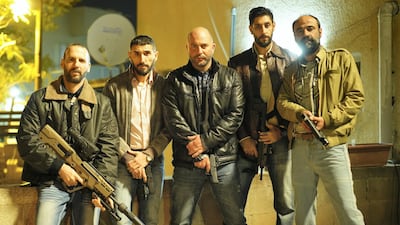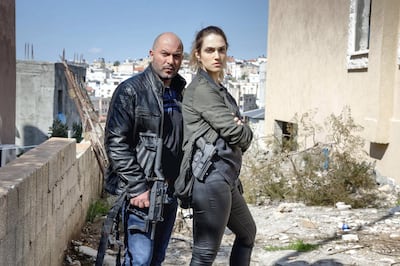Like many people during lockdown, I have found Netflix to be a useful escape from reality, which has now become a vast landscape of uncertainty.
In the last couple of weeks, I finished the third season of Fauda, an Israeli television series. But far from serving as a comforting balm, the series only left me even more agitated.
Fauda – chaos in English – has a storyline centred on the inner world of a tight-knit group of Israeli commandos known as the Mista'aravim, Arabic-speaking soldiers posing as Palestinians.
Fluent in the language and culture, they infiltrate Palestinian villages and families to root out militants. But their clumsy work often destroys innocent lives.
The level of gun violence is more akin to watching three solid hours of Call of Duty or Grand Theft Auto than a sophisticated thriller.
In one crucial scene, Nurit, the only woman in the commando unit, impersonates a French humanitarian worker to gain access to the Gaza Strip.
“Do you have children?” she innocently asks a crossing guard, handing over papers identifying her as an aid worker. “I’m delivering medication to children at Shifa Hospital.”
Nurit’s van bears the neutral emblem of humanitarians around the world: a red cross. But instead of bandages and medicine, it is loaded with an arsenal of weapons.
It is a violation of the Geneva Convention and international humanitarian law for members of the military to impersonate humanitarians or journalists.
In war, the offence is known as perfidy: a false promise of good faith.
So when Fauda, one of the most popular series on Netflix, promotes the use of the Red Cross symbol, which is explicitly protected under international humanitarian law, as a ploy to get into Gaza, it unnerves me deeply. Every time that emblem is abused, its power as a symbol of protection is eroded.
Israel is known to have used this tactic in real life; the scene in Fauda is most likely based on a botched 2018 operation of the Israel Defence Forces when soldiers dressed as humanitarian workers to enter Gaza.
In the early 1990s, during the First Intifada, the Israeli internal security service Shin Bet impersonated journalists in West Bank villages to gain information. On one occasion, they used the real name of a reporter for Israel's Channel 1, Yoram Cohen.
"The big problem for me now is to work in the territories," Cohen later told the Committee to Protect Journalists. "People there know me and now they are afraid of me … my life could be in danger.”
Israel is not alone in having deployed this tactic. It has happened in Pakistan, Nigeria, Sri Lanka and many other places. In Colombia, too, the government has admitted using soldiers to impersonate television journalists and humanitarian aid workers in order to reach the positions of The Revolutionary Armed Forces of Colombia.
By posing as journalists or humanitarians, security forces undermine the role of free press and relief workers, and bring a shadow of mistrust to our profession.
I remember being shocked after the fall of Grozny, Chechnya in January 2000, when the first Russians I saw were not soldiers, but doctors who set up emergency tents to cure the wounded that Moscow's forces had just bombed. The inconsistency stunned me.
As my late colleague Fred Cuny once pointed out, the lines between soldiers and humanitarians have often blurred since antiquity, though usually on the side of conducting genuine humanitarian work rather than using it as a cover.
“The assistance of armies to the populations they had conquered was seen as a humane gesture to the vanquished and, not inconsequentially, a means of winning some degree of loyalty to the new regime.”
Cuny was murdered in Chechnya in April, 1995. His killers were never caught; but Cuny the humanitarian remains legend. I first met him in Sarajevo, Bosnia, where he worked to restore the water and gas system to the battered and besieged city.
After Cuny’s death, my colleagues and I realised how precarious our work was. Journalists and relief workers are often thought to be spies working in hostile areas. The number of times I was detained and accused of being a spy was laughable.
This is entirely down to events of the kind casually depicted in Fauda: security forces crossing the line and pretending to be relief workers or reporters.
ISIS and other Islamist militant groups sometimes captured journalists for ransom, but there was also the underlying suspicion that these reporters were working for foreign governments gathering intelligence. Confessions were often forced through torture.
When two colleagues and I were captured in Kosovo in March 1999 by Serbian paramilitary forces, they stole our gear, marched us into an isolated forest, made us kneel and performed a mock execution before letting us go. They claimed to have thought we were spies when they held us.
According to the Committee to Protect Journalists, the real danger lies in jeopardising “the media's position as an independent body, especially those journalists working in conflict zones who rely on their civilian status, as established by the Geneva Conventions.”
I'm disappointed in the creators of Fauda for making light of international humanitarian law.
One of the series’ actors, Lior Raz was actually a member of one of the commando units and used his first-hand experience for his character. He should have known better. Human rights worldwide are experiencing a massive and dangerous backlash already. We don’t need Netflix to add to that mix.
Janine di Giovanni is a Senior Fellow at Yale’s Jackson Institute and the author, most recently, of 'The Morning They Came for Us: Dispatches from Syria'



